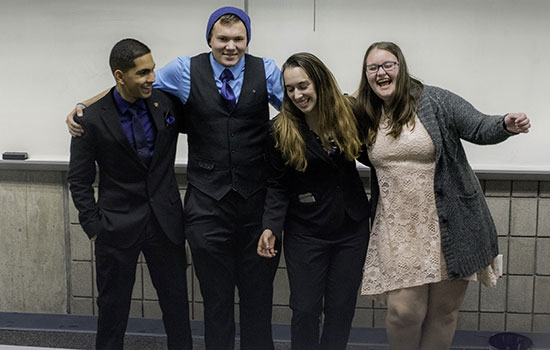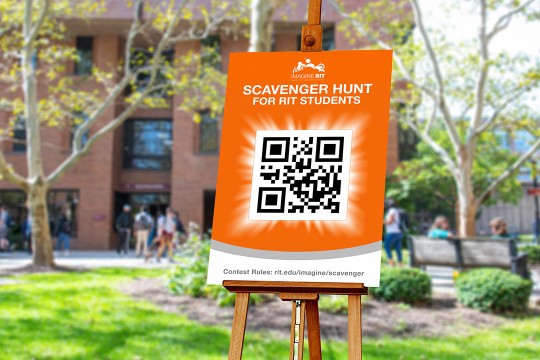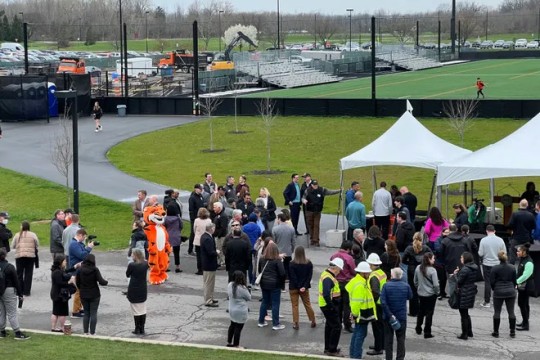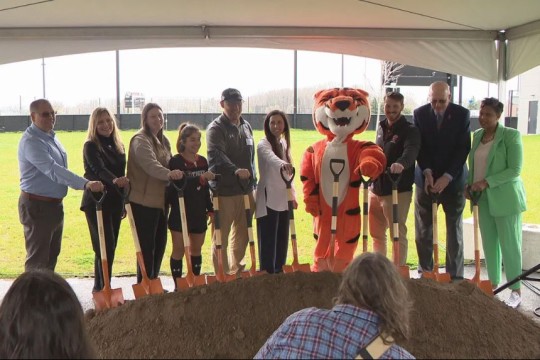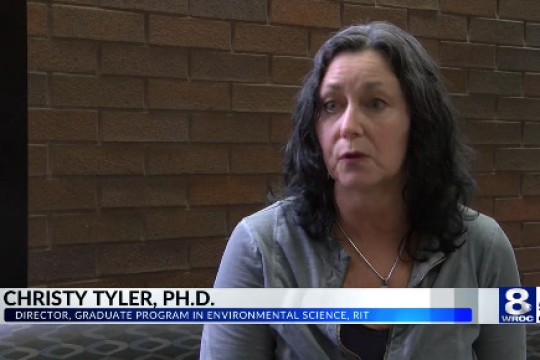Student Spotlight: Turning failing habits around
Student Spotlight Brian Zarzuela, third-year computer engineering technology major
Brian Zarzuela, left, laughs with the other members of the Alpha Phi Omega Xi Zeta chapter board: Noah Parker, middle left, Kimberly Hedger, middle right, and Kelly Thompson, right.
Brian Zarzuela is a third-year computer engineering technology student from New York City who is passionate about service work. On campus, Zarzuela is involved in many organizations, including Men of Color, Honor and Ambition (MOCHA), Silver Wings and the Alpha Phi Omega fraternity as the Xi Zeta chapter vice president of service. He also works as a year-one peer adviser for the Academic Support Center, a Supplemental Instruction (SI) leader and a tutor for the Higher Education Opportunity Program (HEOP). In addition to these volunteer service positions, Zarzeula has also worked for RIT Public Safety in dispatch as an emergency communications aide and continues to work there in reception.
Zarzeula is a model student that is involved in many extracurricular activities, but the road to success wasn’t easy for him. After his first semester of college, Zarzeula was in need of academic support to help him raise his grades and pass his future classes. Through the College Restoration Program, a program designed to help struggling and failing students turn themselves around and cultivate good study habits, Zarzeula was able to improve his grades and motivate himself to become more involved with academic groups on campus.
Question: When did you realize you needed help succeeding academically?
Answer: Unfortunately, I realized very late after I had already pretty much failed everything my first semester. When I got the email from my academic adviser and another from financial aid telling me that I was going to be put on academic suspension, it all hit me. I knew that I had put myself in a hole, but hearing that from my adviser and learning about academic probation, which I didn’t know about before, really made me realize that I needed to fix this and make sure nothing like that ever happened again.
Question: How did you find out about the services offered through the College Restoration Program (CRP)?
Answer: When I was reaching out to people to find things that might be able to help me, my academic adviser at the time mentioned CRP to me. I didn’t know anything about it, so she told me to research it and tell her if I was interested in it. The second she said it, I already had the website pulled up on my laptop and looked at what the program was. I got a good understanding of it in about 30 minutes and I told her, “yes, I want to do whatever I need to do to succeed.”
Question: In what ways do you feel the program helped you get back on track?
Answer: Some of the biggest things that I took out of CRP and still practice is planning and scheduling skills. Really, what it came down to was I was too confident of a student to have a planner and keep track of the work that I needed to do week to week. I got back into that habit of being a better student and telling myself, “Brian, you have to schedule everything and know that you have all these assignments due.” As overwhelming as it may look on paper, it will save your butt and help you in the future. Another big thing that helped me were the advisers. We have CRP advisers that we have to meet with frequently; mine was Stephanie Hayes. I would meet with her and she was someone who was looking at my grades and reports to make sure that I was keeping on top of what I was doing. When I was wondering about different opportunities that were out there, she was able to help guide me and keep me motivated to do what I want to do. When you have someone that is trying to keep you accountable, you feel like if you do anything wrong you kind of let that person down, so having an adviser was very helpful.
Question: How long was it before you began to see results in your study habits and grades for classes?
Answer: There was a solid change in the beginning of my second semester, but that was mostly because I knew that I needed to be more motivated. I looked at CRP as a gift. It was given to me as a second chance, and I didn’t want to waste it. Students get turned away from CRP, so I didn’t want to take advantage of my spot by not caring or taking the skills I learned to heart. I saw results early on because CRP was really good at helping me plan and structure my study habits. Organizationally, I was so much better. I could actually use my notes when I studied because they were more organized, and that was the kind of stuff that CRP taught me. They also forced us to talk to our professors for the classes we were in and that has to be one of the best things they had me do. I still do it every semester. I love meeting with my professors. When you build a relationship with your professor, you can see a huge difference in your interactions. They know my name on the first day of class, and when I need help I don’t need to introduce myself first and then ask for help. It’s always intimidating talking to a professor, and when you start off telling them you’re struggling it can be hard. Getting that good start and good connection, even if I was forced to, was something that I really enjoyed.
Question: Do you feel that CRP helped lead you to participate in MOCHA?
Answer: Definitely. I applied to MOCHA and was recommended for the program last spring semester. During my interview, I was 100 percent honest with them. I told them that I did mess up in college and that I had to build myself back up, and I told them about the CRP program. Sitting in that room and putting myself on the spot, I will never forget their reaction. They told me that this was exactly what they wanted. They wanted someone who was vulnerable enough to admit that they messed up in the past, but they fixed it. Honestly, without CRP, I know getting into MOCHA wouldn’t have been possible.
Question: Why do you feel programs like CRP are important to have for students on campus?
Answer: CRP has to be one of the greatest gifts RIT has to offer for students like me. That is something that I want other colleges to see and to learn from us. Giving students a second chance is important. I wish it was better publicized, it’s a great program to be a part of. Any student who goes through a class with CRP will come out on the other side as a better student. All the people who work at CRP and who worked with me are amazing. You can see that they just want to help students and they want everyone to succeed. They don’t want you to just pass, they want you to be on top, and they are willing to help you out in lots of ways.
Question: What advice would you give to a student who might benefit from the program but may be hesitant to reach out and apply?
Answer: Honestly, it all comes down to taking that initiative. The first time you ask for help is always the hardest. CRP isn’t something to be afraid of or ashamed of. It may not be the first thing you want to tell people all the time, but you have to look at it as an opportunity. Make it your story. It’s OK if you mess up, it’s OK if you have an issue in a class or all your classes, just reach out for help. Don’t let that be the end of your college story. The worst thing that happens is that you reach out and try and it doesn’t work out. If you never reach out, you’ll always look back and think about that “what if?”
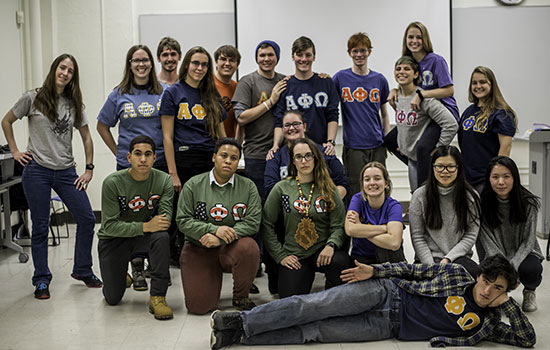 Brian Zarzeula and the other members of the Alpha Phi Omega Xi Zeta chapter.
Brian Zarzeula and the other members of the Alpha Phi Omega Xi Zeta chapter.










